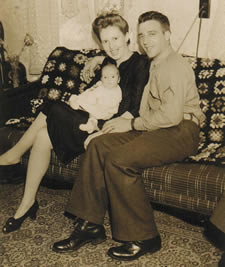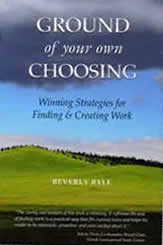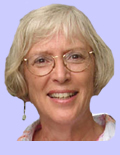
Standing Alone
by Beverly Ryle
Journal Entry, 4-28-07
"My momma died. In the four days she labored toward her last breath and the three days thereafter, when my father threatened to dominate her wake and funeral as he had her life, the best of my recovery didn’t let him strip away her dignity or my ability to be true to myself. I feel joyful, abandoned and sad."
Today is the second anniversary of my mother’s death and my father’s decision to disown me. Both happened simultaneously. Both were inevitable. Although I had not expected to lose my dad at the moment of my mom’s passing (what child would?) I can now see that it was predestined because I was born into a relationship where there was no place for me.
From my first cry as a babe, through my mother’s last breath in my 63rd year, I presented an obstacle to my mom and dad’s enmeshment with each other. My mother tried to maneuver around it by continually trying to reassure my father of his preeminence and meet his demand for her undivided attention at the same time she was trying to have a close relationship with me. Inevitably, she was unable to do both, and my father sought ways to push the barrier aside by making me the cause of anything that created friction between them.
I have often thought it might have been different had I not been an only child, as if siblings could have helped me push open the heavy door that kept me from being seen as the sweet and loving child I was (and still am.) But I know this is an illusion and even a house full of kids cannot stop the unfolding of a codependent drama.
As an only child, I was born into a triangle from which there was no escape. On the one hand, I was always on the outside. On the other, I was readily accessible to be pulled into the middle when the fireworks started.
When my father got angry at my mother for overspending, she would divert the conversation to me, saying that I was careless with my things, and as a result I would be punished for having a messy room.
When my mother complained that he spent every waking hour at the plant, he would say he did it because he wanted to give me all the things he didn’t have growing up, and then he would yell at me for not spending enough time practicing the piano, the one he never had. Thus I fulfilled the role of being a convenient pawn, moved wherever needed to keep the game going—until I entered recovery and stopped playing.
Everything is skewed in a sick family. In a healthy family system, a child’s emergence as a happy, whole, well-functioning adult is celebrated. In a sick one, it is a threat to the status quo.
On a practical level, particularly as they aged, my parents could see the benefits of me being a grownup. They valued having a competent adult as a resource in helping them make decisions. But on an emotional level it wreaked havoc.
I no longer followed their rules. When my father announced on their 50th wedding anniversary that the only problem he and my mother had ever had in their marriage was me, I said, “Bullshit.”
I confronted my mother for “throwing me at the train”, her long held coping skill, when she pretended she didn’t already know my daughter was gay and participated in my dad’s outrage at me for not telling them.
Yet, even as Alzheimer’s caused my father’s grip on her to grow tighter than ever, she was able to appreciate that I had broken free. For my dad, each time I spoke up threatened his sovereignty, even though he was grateful for my help as it became increasing overwhelming for him to care for her.

Before it all burst apart, I spent four days and three nights attending to my dying mother and grieving father as a loving, caring daughter. During those long nights, I took up my post on an oversized, uncomfortable chair between the hospital bed where my mother lay gasping for air, and a cot where my father rested. From there I could stroke my mother’s hand (as she had stroked mine) and hold my father’s with a firm grip (as he would grasp a rake or tool) at the same time.
I was still in the middle, but I was no longer an appendage of their dysfunction. In those silent hours of vigil the losses and pain of my childhood (which lasted until I was in my forties) melted away. I sat there as my own person, shaped both by what my parents had been able to give and what they had not been able to give. And then it came to an end. My mother died while I was taking my grandchild to the hospital coffee shop for ice cream. When I returned to the room, my father immediately started screaming at me, quite literally over her dead body, “My wife died and you weren’t here!” When I said quietly, to claim my existence, that my mother had died as well, it set off a tirade.
A kind Hospice worker assured me I would have time alone with my mother’s body and led me to a bench near the elevators. My father followed me and ordered me to go back into the room. I calmly explained that I needed to sit alone for a little while. He said if I didn’t go back, it would “cost me a million dollars”. I stayed put. I could not go back to being a child or take my mother’s place as the object of his abuse.
Whatever the price - having a father who is alive and will not see or talk to me, losing my inheritance, not having access to the things that belonged to my mother, or the stories about her and our family history only my father knows - it is worth it.
 |
 |
Return to the Summer '09 Life Storie spage
Beverly Ryle Publishes Her New Book
Ground of Your Own Choosing:
Winning Strategies for Finding
& Creating Work

To order go to:
Ground of Your Own ChoosingAmazon Books

Beverly Ryle is a regular contributor to this magazine.
Working as a career counselor and business consultant Beverly has been helping corporate professionals, business owners, and people-in-transition achieve their full potential for over 25 years.
Beverly lives in North Eastham, where she runs the Center for Career and Business Development.
Success on Your Own Terms“When we are really honest with ourselves we must admit our lives are all that really belong to us”
Cesar Chavez